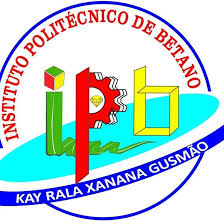INSTITUTO POLITÉCNICO DE BETANO
“KAY RALA XANANA GUSMÃO”
Introduction

IPB is a legal entity governed by public law and enjoys statutory, scientific, cultural and pedagogical, administrative, financial, patrimonial and disciplinary autonomy, without prejudice to the supervisory action of the State, under the terms of these statutes and the law.
Mission and Vision
Vision:
As a public Higher Education Institution, IPB is committed to:
Train and graduate its students with a high level of qualification, in cultural, scientific, artistic, technical and professional aspects;
Provide trainees with essential human values to boost national awareness, endowing them with a sense of service in favor of the well-being of fellow citizens;
Promote understanding, harmony and solidarity between cultures and peoples.
Mission
IPB has its mission such as the creation, dissemination, promotion and application of science, technology and technical-scientific knowledge and knowledge of a professional nature, through the articulation of study, teaching, guided research and experimental development, aiming to support the country’s sustainable development and promote a fairer and more democratic society, valuing the culture of academic experiences.
IPB pursues, among others, the following purposes:
To promote the teaching of excellence, through courses and technical programs competitive at national, regional and international level;
To carry out specialized higher studies, aiming at the attribution of diplomas under the terms of the law, capable of responding to the needs of specialized labor and promoting technical-scientific progress essential for the country’s sustainable development;
To foster research activities aimed at contributing to the innovation, production, transfer and enhancement of scientific and technological knowledge;
To promote a broad base of interinstitutional participation, aimed at the integration of different scientific cultures, with a view to creating innovative synergies for teaching and research;
To provide quality, diversified services to the community, capable of making a relevant contribution to social development and the qualification of human resources;
To foster the preservation, development and articulation of Timorese identity and values by promoting its history, culture and languages;
To contribute to the development of international cooperation and to bringing peoples closer, namely in the fields of education and knowledge, science and technology.
IPB develops its mission in close articulation with society, in a perspective of territorial cohesion and national affirmation.
IPB values the principles of equality and non-discrimination, ensuring the necessary conditions so that all duly qualified individuals can have the same opportunities for access and academic success, regardless, namely, of their gender and their physical and social and economic condition.
IPB and its organic units are governed, in their management and administration, by the principles of democracy and participation of teaching and research staff, non-teaching staff and students, favoring the free expression of the plurality of ideas and opinions and encouraging their involvement in the Institute’s activities.
For the pursuit of its purposes, IPB may enter into agreements, protocols, contracts and other agreements with public or private institutions, national, foreign or international.
Organizational chart

